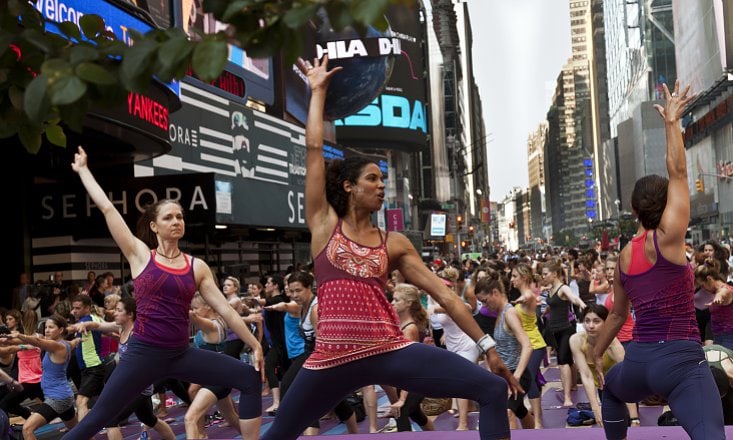In the Western world, there are many cultural challenges to the yogic way of life. Most of us are doing our best to navigate this terrain, aiming to find balance between living a life of non-attachment and finding the perfect outfit for doing Crow Pose.
We all aim for inner peace and contentment, while using our iPhones to time our 20 minutes of morning meditation—just after we take a moment to go through our FB news feed. What? A kitten befriends a baby crocodile? A MUST-SEE!
To exist in a purist yogic state amidst the seductions of modern living is next to impossible. There are too many distractions, temptations, and gadgets that will take you out of the yogic “now” and transport you into the consumerist-confused chaos of the times.
Even when I’m only buying fair trade, organic fabrics harvested by virgins who donate half their proceeds to support small business that manufacture fair trade, organic fabrics—I’m still participating in the endless system of supply and demand.
A Religion of Spending
Consumerism is almost a religion in the Western World. We’re inundated with advertisements reminding us of all the stuff we need to have in order to become the person we want to be.
Even in the yoga world, a lifestyle that actively tries to prioritize spirituality over shopping, there’s still the pervasive messaging of buy, buy, buy. Try our harem yoga pants, match it with these headscarves, and pair it with this eco yoga mat made from elephant dung!
Yoga has become an upwards of $27 billion dollar-industry because we all have to purchase the proper attire, accessories, and symbols to prove our identity.
Although procuring goods from yoga-oriented companies at least means you’re supporting businesses that have socially responsible intentions, it’s still feeding the same psychological relentless obsession with stuff.
Living in a first-world country, we have seemingly endless options of things we can acquire. Yet, practically, we all know there are finite resources on the planet, and there is only so much room in your closet.
This duality highlights how our cravings are in direct contrast with our rational understandings. Yet it is not just a willful ignorance that puts us in this conundrum.
The Concept of False Need
The father of modern PR and propaganda, Edward Bernays, was actually the nephew of none other than Sigmund Freud. Through his influence, the world of advertising became the effort to manipulate the masses into the concept of false need.
Bernays’s prevailing philosophy was that through mass production, big business could fulfill the endless desires of society.
He believed he could tap into the existential hole we all have, penetrate it with material objects, pump in and out with his throbbing knowledge that we all feel incomplete, and then erupt his man juices into the deep abyss of insecurity that we aren’t good enough.
Bernays was well aware of the workings of the inner mind, and how so many of us struggle with matters of identity, self-love, and acceptance. He knew that by reminding us of this inbred doubt, we would feel confused and empty. We would look to material objects to save us from ourselves.
Bernays felt that humans have a carnal desire for more, and that energy could be channeled to create a legion of people who ultimately would become functions of the economy to make more money for the business elite.
The business world has greatly benefited from the guidance of Bernays, yet civilization is left dealing with the effects of this materialist mentality.
Breaking the Cycle of Consumerism
A commitment to a genuinely yogic existence can help us break this cycle. The teachings promote simplicity, and renounce an existence of excess.
Even though products are constantly being shoved in our faces, the message of yoga reminds you that no matter how many cute mala bead necklaces you find on Instagram, there is much more to life inside of you than what you could ever purchase from the outside.
The more devoted we are to the wisdom of yoga, the better we will address that fragile piece of our ego that is so easily manipulated by media.


